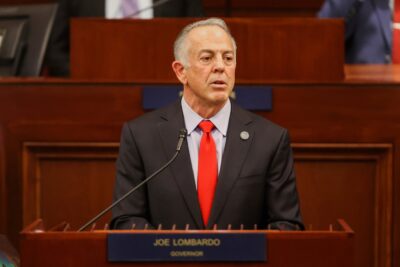And… cut! Nevada lawmakers narrowly reject plan to lure movie projects to Vegas
By Canadian Press on November 20, 2025.

CARSON CITY, Nevada (AP) — That’s a wrap on a pitch to bring more movie productions to Nevada.
A union-backed effort to offer millions in tax credits failed by one vote as the Nevada Legislature’s weeklong special session concluded Wednesday.
The failure of the controversial film tax proposal is a loss for both Republican Gov. Joe Lombardo, who was expected to sign it, as well as the supporters who poured over a million dollars in lobbying for it.
But lawmakers — who considered over a dozen measures in the session — saw some of the governor’s priorities through the finish line. The governor’s flagship crime bill made it to his desk, but with amendments that could threaten his signature.
His sweeping crime package called the “Safe Streets and Neighborhoods Act” would increase penalties for a long list of crimes, including smash-and-grab robberies, assault and battery against hospitality employees, and DUIs involving a death. It also calls to revive a court program that handled criminal cases originating on the Las Vegas Strip and coincided with orders banning people from the corridor for a year.
But the Democratic-majority Senate made changes to his bill to include immigration-related provisions the governor might not be able to get behind. The amendment requires detention facilities to maintain a running list of people they hold. It also prohibits law enforcement officers — including immigration officers — from entering school grounds without a warrant or obtain information about a student. Lombardo vetoed a similar bill in June, calling it “well-intentioned but fundamentally overbroad.”
The special session was supposed to serve as an opportunity for Lombardo, a former Clark County sheriff, to pass his major policy priorities ahead of the 2026 election less than a year away. Lombardo is considered one of the most vulnerable Republican governors fighting for reelection.
“Nevadans deserved action now — not years from now — on the issues that most impact their daily lives,” he said in a statement on Wednesday.
Hollywood film studios incentive fails
The legislation to offer $95 million in annual transferable tax credits to Sony Pictures Entertainment and Warner Bros. Discovery for a new film production facility in the Vegas suburbs previously failed the Legislature’s regular session in June, but it was brought back after a campaign from trade unions.
It would have created the Summerlin Studios Project — a production facility consisting of 10 movie stages, hotels and a medical center. The state Senate was one vote short from passing the bill Wednesday night, with three Republican members absent.
Supporters framed it as a “jobs bill,” saying the project would create 19,000 construction jobs and 18,000 permanent jobs — a much needed economic boost in a state that has seen a decrease in tourism.
Construction workers flocked to the Legislature to urge lawmakers to support the bill, saying some people haven’t worked a big job in Southern Nevada for two years since the completion of entertainment destinations like the Fontainebleau and the Sphere. They compared the project to the construction of Hoover Dam, which employed 21,000 people.
“Southern Nevada workers in general need job opportunities,” Alfonso Lopez, an organizer with Sheet Metal Workers Local 88, said in a hearing.
But the proposal struggled from the start, with opponents on both sides of the aisle arguing it didn’t make financial sense when legislative fiscal staff predict a deficit of up to $260 million by 2030.
“That means we will have to either raise taxes or cut the already limited services that we are providing,” Assemblymember Selena La Rue Hatch, the Democratic lawmaker who tried to block the bill, told The Associated Press.
It narrowly passed the Assembly after efforts were made to sweeten the deal for those on the fence by dedicating money to medical expenses for retired state employees and to expand pre-K programs in Vegas-area schools.
La Rue Hatch, a teacher in Reno, said if pre-K and state employees were truly priorities, they’d receive more than “crumbs” added in the film tax.
“If Hollywood is the emergency, then Nevada leaders have lost the plot, and if tone deafness were taxable, perhaps our schools would be fully funded,” said Alexander Marks, deputy executive director of field and communications at the Nevada State Education Association, which represents teachers across Nevada.
Senators ultimately agreed, rejecting the bill over similar concerns.
Resort Corridor Court bill heads to governor’s desk
Both the resort industry and the most powerful union in Nevada pushed the proposal calling for the revival of the court program, which had ended in 2024. It exclusively covered minor crimes originating from the Strip and coincided with orders banning repeat offenders from the area for a year.
Supporters argued it is necessary to make the Strip safer for workers and protect Las Vegas’ reputation among tourists, especially at a time when the city has seen a slump in tourism.
“The success and failure of tourism as a destination is closely related to providing its tourists and our employees with a safe and secure environment,” Karlos LaSane, a regional vice president of government affairs and community affairs for Caesars Entertainment, said during a hearing.
Opponents said the program unfairly targeted homeless people and did not provide them with enough resources.
Brennan Bartley, a public defender who represented clients in the Resort Corridor Court, said the people most heavily impacted were homeless and weren’t doing anything wrong while on the corridor. His clients were promised to be connected with resources, but those never materialized, he said.
“These are failed experiments that harm some of the most vulnerable among us,” Bartley said during a hearing.
Jessica Hill, The Associated Press
-31

